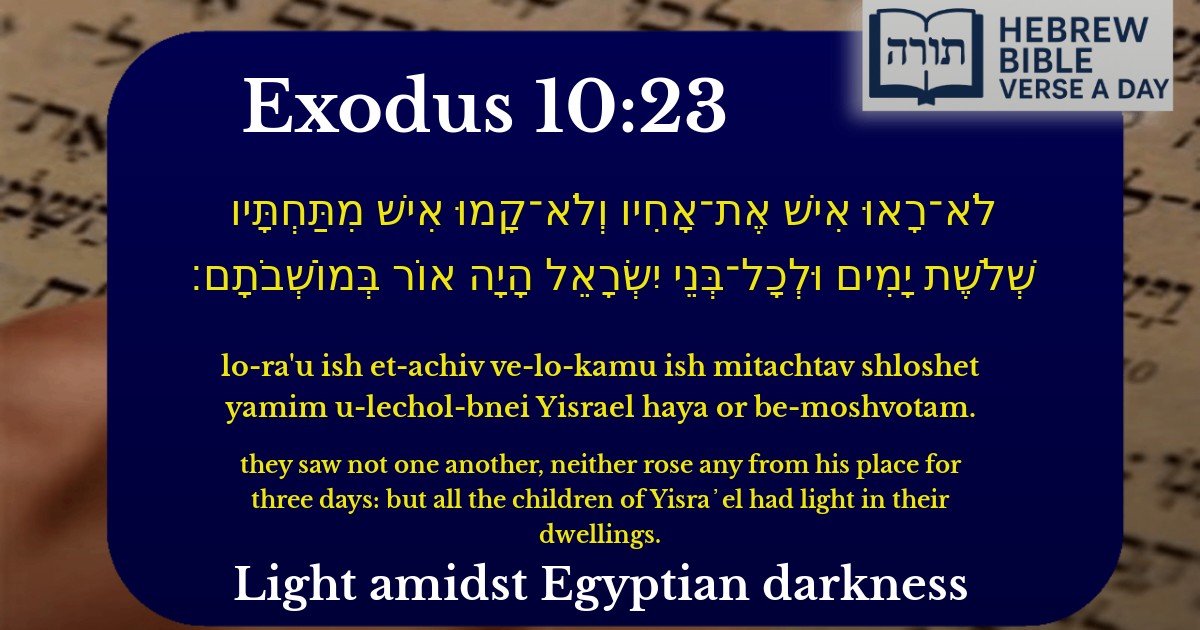Join Our Newsletter To Be Informed When New Videos Are Posted
Join the thousands of fellow Studends who rely on our videos to learn how to read the bible in Hebrew for free!
Hebrew Text
לֹא־רָאוּ אִישׁ אֶת־אָחִיו וְלֹא־קָמוּ אִישׁ מִתַּחְתָּיו שְׁלֹשֶׁת יָמִים וּלְכָל־בְּנֵי יִשְׂרָאֵל הָיָה אוֹר בְּמוֹשְׁבֹתָם׃
English Translation
they saw not one another, neither rose any from his place for three days: but all the children of Yisra᾽el had light in their dwellings.
Transliteration
Lo-ra'u ish et-achiv ve-lo-kamu ish mitachtav shloshet yamim u-lechol-bnei Yisrael haya or be-moshvotam.
Hebrew Leining Text
לֹֽא־רָא֞וּ אִ֣ישׁ אֶת־אָחִ֗יו וְלֹא־קָ֛מוּ אִ֥ישׁ מִתַּחְתָּ֖יו שְׁלֹ֣שֶׁת יָמִ֑ים וּֽלְכׇל־בְּנֵ֧י יִשְׂרָאֵ֛ל הָ֥יָה א֖וֹר בְּמוֹשְׁבֹתָֽם׃
לֹֽא־רָא֞וּ אִ֣ישׁ אֶת־אָחִ֗יו וְלֹא־קָ֛מוּ אִ֥ישׁ מִתַּחְתָּ֖יו שְׁלֹ֣שֶׁת יָמִ֑ים וּֽלְכׇל־בְּנֵ֧י יִשְׂרָאֵ֛ל הָ֥יָה א֖וֹר בְּמוֹשְׁבֹתָֽם׃
🎵 Listen to leining
Parasha Commentary
📚 Talmud Citations
This verse is quoted in the Talmud.
📖 Sotah 11b
The verse is referenced in the context of discussing the plagues in Egypt, particularly the plague of darkness, and how the Israelites were unaffected by it.
📖 Sanhedrin 39b
The verse is mentioned in a discussion about the miracles performed for the Israelites in Egypt, emphasizing the distinction between the Israelites and the Egyptians during the plagues.


Context in the Plagues of Egypt
The verse (Shemot 10:23) describes the ninth plague—darkness—that struck Egypt while Bnei Yisrael had light in their dwellings. This plague lasted three days, during which the Egyptians could not see one another or move from their places. The contrast between the Egyptians and Bnei Yisrael highlights Divine intervention and the distinction between the oppressors and the oppressed.
Rashi's Explanation
Rashi (Shemot 10:23) explains that the darkness was so thick that the Egyptians could not even see each other, nor could they rise from their seated positions. This immobilized them, preventing any resistance or escape. Meanwhile, Bnei Yisrael had light, allowing them to inspect the Egyptian homes and identify where valuables were stored. This later facilitated the fulfillment of Hashem's promise that Bnei Yisrael would leave Egypt with great wealth (Shemot 3:22).
Midrashic Insights
Rambam's Perspective
Rambam (Moreh Nevuchim 3:10) discusses how the plagues demonstrated Hashem's control over nature. The darkness, in particular, defied natural laws, as it was not merely an absence of light but a tangible obstruction—preventing movement and vision only for the Egyptians.
Light for Bnei Yisrael
The light in the dwellings of Bnei Yisrael was miraculous, as it allowed them to see while the Egyptians were engulfed in darkness. The Mechilta (Bo 13) notes that this light was not merely physical but also spiritual, symbolizing the Divine favor and protection granted to Bnei Yisrael even amidst the plagues.